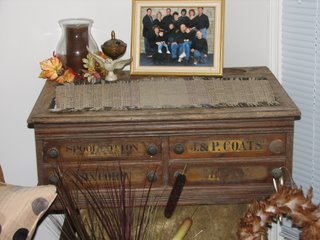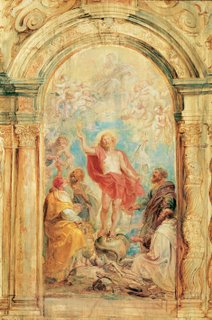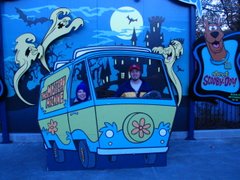
In dealing with Don's death, I have recently sought the comfort of God through the writings of N. T. Wright. Specifically, I have read For All the Saints? Remembering the Christian Departed. Through it all, after dealing with purgatory, heaven, hell and all that, Wright shares three parts to his conclusion.
First, "What happens to the soul?" He avoids all talk of the soul until the very end, and in truth still avoids it somewhat. Personally, I am reluctant to talk of the soul. Scripturally the dichotomy is post-exilic. And really, it is stressed the most in these binarily opposed, Platonic terms by Paul (obviously Roman educated). Wright however settles without settling (and I think I like this). In reference to Revelation 6, he refers to the soul as a "useful way of talking about personal continuity despite bodily discontinuity." Wright talks about the Cambridge physicist/theologian (a combination of biblical proportion, snicker), John Polkinghorne who said, "God will download our software on to his hardware, until the day comes when he gives us new hardware on which to run our own software once more." Clever and without the Platonic mishmash. Polkinghorne leaves gray what the New Testament leaves gray. Wright writes, "You could simply say, if you like, following Polkinghorne's image, that those who have died as a part of God's people are sustained in life by God. Couple that with Paul's remark about 'departing and being with Christ', and that's about as far as you can go in terms of what the New Testament teaches."
Next, Wright tackles "Praying for and with the Dead?" I think here we have an interesting problem for most protestants. The assumption is that without purgatory (Wright clearly doesn't believe in purgatory, by the way) there is no reason to pray for the departed. Because of the promises of Christ, there is no need to convince God to accept those whom he has already accepted. However, Wright says, "True prayer is an outflowing of love." When we love someone, we will want to pray for them, no difficulties, no needs, but merely "because holding them up in God's presence is the most natural and appropriate thing to do." God also chooses to work through our prayers (personal emphasis on chooses to those who think he must) to bless others. Our love doesn't stop at death. Wright might say that grief is love in the presence of absence. Grief is "the form love takes when the object of love has been removed; it is love embracing an empty space, love kissing the air and feeling the pain of that nothingness." He concludes that there is no reason why love ends at death. Love continues and can continue through the prayers that lift the loved one up in prayer before the mystery of God. The prayer for the departed becomes a celebration! Here, here, Wright!
Finally, death is not the end, but neither is the rest (heaven, paradise, etc.) after death. Our hope is in the Resurrection. We believe in Christ's Resurrection, his the first, and we believe in our own resurrection. The Apostle's Creed and Scripture are clear regarding this bodily resurrection to come. Wright talks extensively about the disparity between the Scriptures and the belief of many folks in the eternity in heaven. Heaven/Paradise is not our final destination, the resurrection and the New Heaven and New Earth as one is! So, Wright has encouraged a change in the liturgy of funerals. No longer should we say, "May the souls of the faithfully departed rest in peace." He encourages, as would I, dropping "the souls of" and adding "and rise in glory."
So, I say it now, May the departed, through the mercy of God, rest in peace and rise in glory. Grief is such a hard thing for me to talk about. I still cry at the mere mention of my brother's name or the playing of B. B. King and Eric Clapton. But it is gradually getting (not easier) better. Such is the process of grief. I pray in love, that Don's rest in the presence of Jesus Christ fills him with all the grace of God and that same grace will fill me and comfort me and my sister, Marsha and their boys Chad and Chandler and the rest of our family. May he rest until we rise again in glory. Amen.









